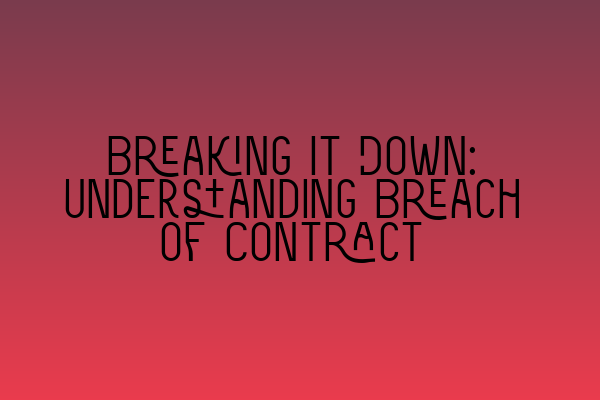Breaking It Down: Understanding Breach of Contract
Contracts are the backbone of business transactions and personal agreements alike. They ensure that parties involved fulfill their respective obligations and create a sense of security and trust in the legal landscape. However, not all contracts are honored, leading to what is known as a breach of contract.
In this article, we will break down the concept of breach of contract, exploring its definition, types, consequences, and possible remedies. Understanding breach of contract is crucial for both individuals and businesses to protect their rights and seek appropriate legal recourse when necessary.
What is a Breach of Contract?
A breach of contract occurs when one or more parties involved in a contract fail to fulfill their agreed-upon obligations. This can involve actions such as not delivering goods or services as promised, not providing payment as agreed, or not meeting any other terms outlined in the contract.
By breaching a contract, the party at fault violates the terms and conditions agreed upon and jeopardizes the trust and expectations established between the contracting parties.
Types of Breach of Contract
There are two main types of breach of contract: minor breach and material breach.
1. Minor Breach: Also known as a partial breach, this occurs when a party fails to perform a small, insignificant aspect of the contract. In a minor breach, the overall purpose and intent of the contract are still upheld.
2. Material Breach: This type of breach is more severe and significantly affects the essence of the contract. A material breach occurs when one party fails to fulfill a crucial aspect of the agreement, rendering the contract virtually useless or impossible to execute as intended.
Consequences of Breach of Contract
When a breach of contract occurs, various consequences may follow, depending on the severity and impact of the breach. Here are a few possible outcomes:
1. Damages: The non-breaching party may be entitled to monetary compensation, known as damages. This aims to compensate for any losses incurred as a result of the breach.
2. Specific Performance: In some cases, a court may order the breaching party to fulfill their obligations as outlined in the original contract. This remedy is often available for unique or specific situations where monetary compensation is not sufficient.
3. Termination of the Contract: The non-breaching party may choose to terminate the contract altogether, releasing both parties from their obligations. This may happen when the breach is significant and irreparable, or if the breach has already caused substantial harm.
4. Liquidated Damages: Some contracts include provisions that predetermine the amount of damages to be paid in the event of a breach. This is called liquidated damages and is agreed upon by the parties beforehand.
Remedies for a Breach of Contract
When dealing with a breach of contract, it is essential to understand the available remedies. These include:
1. Legal Action: The non-breaching party may choose to file a lawsuit against the party at fault, seeking damages or specific performance through litigation. Legal action aims to resolve the dispute in a court of law.
2. Mediation or Arbitration: Alternative dispute resolution methods, such as mediation or arbitration, can provide a faster and more cost-effective approach to resolving breach of contract issues. These methods involve the intervention of a neutral third party who helps facilitate negotiations and reach a mutually acceptable resolution.
3. Contract Termination: Depending on the circumstances, the non-breaching party may decide to terminate the contract and seek remedies such as returning any goods or funds exchanged. This effectively cancels the contract and releases both parties from their obligations.
Conclusion
Understanding breach of contract is crucial in today’s complex legal landscape. By recognizing the types, consequences, and available remedies, individuals and businesses can protect their rights and navigate through breach of contract situations effectively.
If you need legal guidance or advice regarding breach of contract issues, mentorship for aspiring solicitors can provide valuable insight and support. Additionally, exploring alternative dispute resolution methods and honing contract drafting and negotiation skills are vital tools for solicitors in dealing with breach of contract cases. Navigating the legal practice course (LPC) can also provide the necessary qualification to become a successful solicitor.
Remember, breach of contract is a serious matter, and seeking professional assistance is always recommended to ensure the best outcome for all parties involved.
Sources:
Mentorship for Aspiring Solicitors: Nurturing Talent in the Legal Field
Mentorship for Aspiring Solicitors: Finding Guidance on Your Legal Journey
Exploring Alternative Dispute Resolution: An Effective Approach to Legal Conflicts
The Art of Contract Drafting and Negotiation: Skills Every Solicitor Should Master
Navigating the Legal Practice Course (LPC): Your Path to Solicitor Qualification
